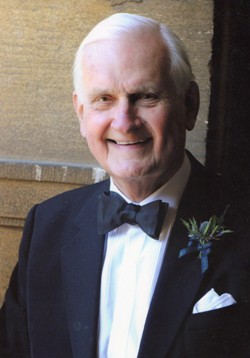Ronald George MacLean 1925-2012
 Oil industry geologist whose reconnaisance discovered the missing US warplane Lady be Good, wrecked in the Libyan desert 15 years before, marooning her unfortunate crew.
Oil industry geologist whose reconnaisance discovered the missing US warplane Lady be Good, wrecked in the Libyan desert 15 years before, marooning her unfortunate crew.
R G (Ronnie) MacLean was born in Southsea on 23 August 1925, and his first four years were spent in India where his father was with the Indian Agriculture Service. On returning to the family home at Tobermory on the Isle of Mull he went first to the local primary school and then boarded (happily) at George Watson’s College, Edinburgh and, from 1939, at Glenalmond in Perthshire.
He went up to Trinity College, Oxford in 1943 to read Mathematics and Physics; but this was wartime, and the following year he was called up to undertake flying training in Canada for the Fleet Air Arm. Returning to Oxford in 1946, but switching to Chemistry, he was again called upon for more flying training only four months later. Finally demobilised in 1947 he taught for a while at Glenalmond, but then resumed his education at Oxford, studying Geology before graduating in 1949.
Ronnie joined the Anglo-Iranian Oil Company that year and was posted to Persia. Field surveys in remote areas, often away for months on end, were much to his liking. In 1952 he married Bette, also from Tobermory, and the first six months of their married life were spent in Sicily where Anglo-Iranian were exploring. There then followed a three-year spell in East Africa (based in Mombasa and Dar-es-Salaam) before being posted to Libya in the mid-1950s. (The company changed its name to British Petroleum in 1954.)
His role as Senior Geologist, based in Tripoli, was to supervise a team of some half-dozen geologists, including the present writer - and he is remembered as a kind and generous boss. His and Bette’s first child, Carol, was born in the British Army hospital in Tripoli in 1958. In the same year, Ronnie was conducting an aerial reconnaissance over the Calanscio Sand-sea when he spotted what appeared to be a near-intact US bomber lying on the desert floor. Later, two BP geologists located the Liberator on the ground; it had crash-landed in 1943 and remained undiscovered for 15 years. Its name was ‘Lady be Good’ and a tragic story later unfolded, involving the discovery of the crew’s skeletons and a poignant diary of their final days.
A posting to Greece followed in 1960, followed by three years at BP’s headquarters in London (1962-1965). Ronnie’s final posting with BP was to Trinidad, but then in 1967 he decided on a career change. He was appointed by the UN as Director of a project in Poland to exploit potash deposits, based in Warsaw (1968-1970). Another, longer, UN project followed, in Santiago, Chile (1970-1976). Then followed a period of consulting, based in London - including projects in Egypt and Bangladesh - before he retired and settled with Bette in Edinburgh.
Retirement interests included researching the history of Clan MacLean, occasional games of golf, their summer cottage on Tiree, and keeping in touch with his old BP colleagues. Bette died in 2005 and Ronnie had been a devoted husband. He died in Edinburgh on 5 April 2012, aged 86, and is survived by daughter Carol, son John, and five grandchildren.
By Michael F Ridd and Carol Foster (née MacLean)